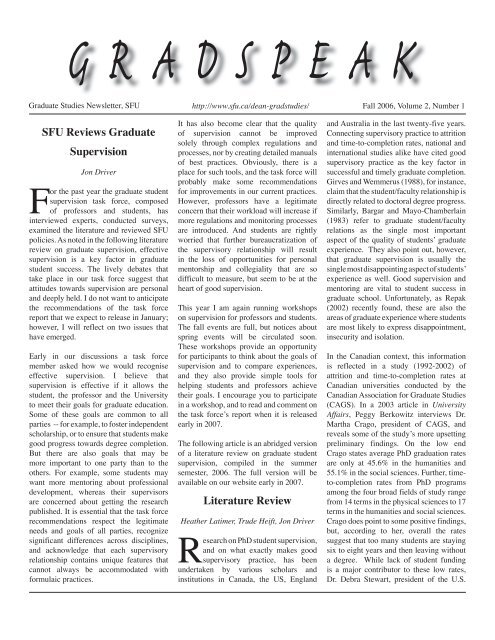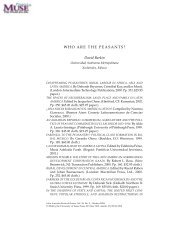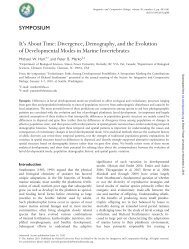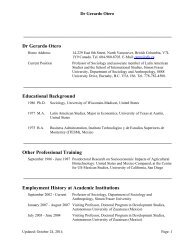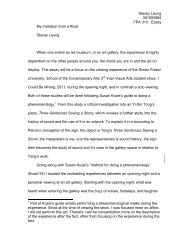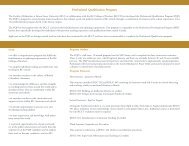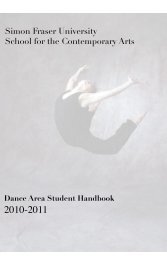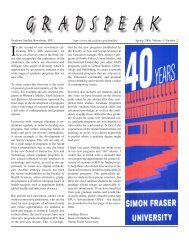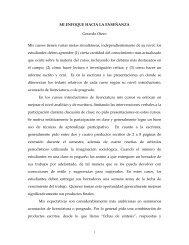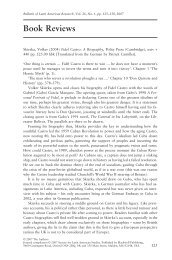Fall 2006, Volume 2, Number 1 - Simon Fraser University
Fall 2006, Volume 2, Number 1 - Simon Fraser University
Fall 2006, Volume 2, Number 1 - Simon Fraser University
Create successful ePaper yourself
Turn your PDF publications into a flip-book with our unique Google optimized e-Paper software.
G R A D S P E A K<br />
Graduate Studies Newsletter, SFU http://www.sfu.ca/dean-gradstudies/ <strong>Fall</strong> <strong>2006</strong>, <strong>Volume</strong> 2, <strong>Number</strong> 1<br />
SFU Reviews Graduate<br />
Supervision<br />
Jon Driver<br />
For the past year the graduate student<br />
supervision task force, composed<br />
of professors and students, has<br />
interviewed experts, conducted surveys,<br />
examined the literature and reviewed SFU<br />
policies. As noted in the following literature<br />
review on graduate supervision, effective<br />
supervision is a key factor in graduate<br />
student success. The lively debates that<br />
take place in our task force suggest that<br />
attitudes towards supervision are personal<br />
and deeply held. I do not want to anticipate<br />
the recommendations of the task force<br />
report that we expect to release in January;<br />
however, I will reflect on two issues that<br />
have emerged.<br />
Early in our discussions a task force<br />
member asked how we would recognise<br />
effective supervision. I believe that<br />
supervision is effective if it allows the<br />
student, the professor and the <strong>University</strong><br />
to meet their goals for graduate education.<br />
Some of these goals are common to all<br />
parties -- for example, to foster independent<br />
scholarship, or to ensure that students make<br />
good progress towards degree completion.<br />
But there are also goals that may be<br />
more important to one party than to the<br />
others. For example, some students may<br />
want more mentoring about professional<br />
development, whereas their supervisors<br />
are concerned about getting the research<br />
published. It is essential that the task force<br />
recommendations respect the legitimate<br />
needs and goals of all parties, recognize<br />
significant differences across disciplines,<br />
and acknowledge that each supervisory<br />
relationship contains unique features that<br />
cannot always be accommodated with<br />
formulaic practices.<br />
It has also become clear that the quality<br />
of supervision cannot be improved<br />
solely through complex regulations and<br />
processes, nor by creating detailed manuals<br />
of best practices. Obviously, there is a<br />
place for such tools, and the task force will<br />
probably make some recommendations<br />
for improvements in our current practices.<br />
However, professors have a legitimate<br />
concern that their workload will increase if<br />
more regulations and monitoring processes<br />
are introduced. And students are rightly<br />
worried that further bureaucratization of<br />
the supervisory relationship will result<br />
in the loss of opportunities for personal<br />
mentorship and collegiality that are so<br />
difficult to measure, but seem to be at the<br />
heart of good supervision.<br />
This year I am again running workshops<br />
on supervision for professors and students.<br />
The fall events are full, but notices about<br />
spring events will be circulated soon.<br />
These workshops provide an opportunity<br />
for participants to think about the goals of<br />
supervision and to compare experiences,<br />
and they also provide simple tools for<br />
helping students and professors achieve<br />
their goals. I encourage you to participate<br />
in a workshop, and to read and comment on<br />
the task force’s report when it is released<br />
early in 2007.<br />
The following article is an abridged version<br />
of a literature review on graduate student<br />
supervision, compiled in the summer<br />
semester, <strong>2006</strong>. The full version will be<br />
available on our website early in 2007.<br />
Literature Review<br />
Heather Latimer, Trude Heift, Jon Driver<br />
Research on PhD student supervision,<br />
and on what exactly makes good<br />
supervisory practice, has been<br />
undertaken by various scholars and<br />
institutions in Canada, the US, England<br />
and Australia in the last twenty-five years.<br />
Connecting supervisory practice to attrition<br />
and time-to-completion rates, national and<br />
international studies alike have cited good<br />
supervisory practice as the key factor in<br />
successful and timely graduate completion.<br />
Girves and Wemmerus (1988), for instance,<br />
claim that the student/faculty relationship is<br />
directly related to doctoral degree progress.<br />
Similarly, Bargar and Mayo-Chamberlain<br />
(1983) refer to graduate student/faculty<br />
relations as the single most important<br />
aspect of the quality of students’ graduate<br />
experience. They also point out, however,<br />
that graduate supervision is usually the<br />
single most disappointing aspect of students’<br />
experience as well. Good supervision and<br />
mentoring are vital to student success in<br />
graduate school. Unfortunately, as Repak<br />
(2002) recently found, these are also the<br />
areas of graduate experience where students<br />
are most likely to express disappointment,<br />
insecurity and isolation.<br />
In the Canadian context, this information<br />
is reflected in a study (1992-2002) of<br />
attrition and time-to-completion rates at<br />
Canadian universities conducted by the<br />
Canadian Association for Graduate Studies<br />
(CAGS). In a 2003 article in <strong>University</strong><br />
Affairs, Peggy Berkowitz interviews Dr.<br />
Martha Crago, president of CAGS, and<br />
reveals some of the study’s more upsetting<br />
preliminary findings. On the low end<br />
Crago states average PhD graduation rates<br />
are only at 45.6% in the humanities and<br />
55.1% in the social sciences. Further, timeto-completion<br />
rates from PhD programs<br />
among the four broad fields of study range<br />
from 14 terms in the physical sciences to 17<br />
terms in the humanities and social sciences.<br />
Crago does point to some positive findings,<br />
but, according to her, overall the rates<br />
suggest that too many students are staying<br />
six to eight years and then leaving without<br />
a degree. While lack of student funding<br />
is a major contributor to these low rates,<br />
Dr. Debra Stewart, president of the U.S.
Graduate Studies Newsletter, SFU<br />
http://www.sfu.ca/dean-gradstudies/ <strong>Fall</strong> <strong>2006</strong>, <strong>Volume</strong> 2, <strong>Number</strong> 1<br />
Council of Graduate Schools (CGS), tells<br />
Berkowitz that mentoring plays an equally<br />
important role. According to Stewart,<br />
mentoring is not only the most important<br />
single factor in completing a program but it<br />
is also the most difficult to define in a way<br />
that fits all cases. Recognizing a problem<br />
common to all studies on supervisory<br />
practice, Stewart acknowledges that,<br />
although the CGS knows that mentoring is<br />
important to student success, it is hard to<br />
define as a set of practices.<br />
One of the reasons good supervisory<br />
practice is difficult to define is because<br />
other factors that affect attrition and<br />
completion rates, such as financial support,<br />
departmental characteristics, socialization,<br />
isolation and social factors such as gender,<br />
race and ability are also connected in<br />
varying degrees to the relationship students<br />
have with their supervisors (Girves and<br />
Wemmerus, 1988). Another reason is<br />
that most literature on supervision tends<br />
to focus on the negative effects of poor<br />
mentoring and researches students who<br />
leave school disappointed (Leaving the<br />
Ivory Tower) rather than concentrating<br />
on best practices. Several areas of<br />
literature, however, identify mentoring<br />
and supervisory strategies that have been<br />
employed successfully by students, faculty<br />
and administrators at institutions nationally<br />
and internationally. What follows is a brief<br />
summary of the literature identifying<br />
common themes in the advice for students,<br />
supervisors and administrators, and a<br />
selected bibliography.<br />
How to Survive Graduate School –<br />
Literature Aimed at Students<br />
Books, pamphlets, articles, and websites<br />
aimed at graduate students often target<br />
students entering school who are in the<br />
process of choosing a supervisor. Books<br />
such as Getting What You Came For,<br />
How to Get a PhD, In Pursuit of the<br />
PhD, Being Bright is Not Enough, and<br />
Successful Dissertations and Theses warn<br />
students they will need to manage their<br />
graduate experience and their supervisors<br />
rather than vice versa. Focusing on typical<br />
problems that can occur between students<br />
and supervisors, these books consistently<br />
tell students that choosing an advisor is the<br />
single most important decision a graduate<br />
student makes during his or her graduate<br />
career (Lovitts, 2001) and that, according<br />
to Hawley (1993), self-management is<br />
more important now than it has ever been<br />
before. Informing new graduate students<br />
how to move through their programs<br />
successfully and speedily, the advice<br />
in these books is practical and useful if<br />
students are proactive enough to seek the<br />
books out and assertive enough to put this<br />
“self-management” advice into practice.<br />
The most useful place for schools to post<br />
expectations regarding graduate student<br />
supervision, and for students to find<br />
out about them and learn how to selfadvocate,<br />
is on university websites across<br />
Canada. Offering accessible guidelines on<br />
what students should expect from their<br />
supervisors, the information provided<br />
ranges from open-ended descriptions<br />
of supervisory practice to detailed and<br />
prescriptive listings of what students,<br />
supervisors, and administrators need to<br />
know and do to ensure best practices are<br />
put into effect and take root.<br />
Common Themes in the<br />
Advice for Students<br />
• Discuss expectations (including<br />
those that are not program-based such<br />
as attendance at conferences, grant<br />
applications, RA/lab duties, etc.)<br />
• Learn to manage time, establish<br />
goals, and follow deadlines<br />
• Initiate contact regularly with supervisor<br />
• Learn to respect your<br />
supervisor’s criticism<br />
• Recognize your supervisor may be busy<br />
• Have academic integrity and honesty<br />
• Get involved in your department<br />
Learning New Pedagogy –<br />
Literature for Supervisors<br />
Brown & Atkins (1988) suggest that<br />
graduate student supervision is probably<br />
the most complex and subtle form of<br />
teaching in which a professor engages.<br />
Despite the importance and complexity<br />
of graduate student supervision there<br />
has been very little empirical research<br />
done on the process. Recent guidebooks<br />
on the topic, however, are compact and<br />
useful, concentrating both on supervisory<br />
problems and on good practice. One<br />
of the easiest and most effective ways<br />
supervisors, and faculty in general, can<br />
become mentors, colleagues, researchers,<br />
friends and contribute to graduate student<br />
success is through academic socializing.<br />
Usually not thought of as “supervisory<br />
practice” per se, social interactions and<br />
social-academic interactions between<br />
faculty and students are vital to student<br />
life. In fact, proper student socialization is<br />
a key factor in fighting a common reason<br />
for attrition: isolation.<br />
Common Themes in the<br />
Advice for Supervisors<br />
• Adjust perceptions of supervisor/<br />
student relationship<br />
• Be interested in the student as<br />
a person as well as a student<br />
• Give timely responses to work<br />
and thoughtful feedback<br />
• Identify what you expect and explain<br />
your working and communication habits<br />
• Expect to act in several roles: as<br />
mentor, researcher, friend and colleague<br />
• Initiate regular meetings<br />
Making the Rules –<br />
Literature for Administrators<br />
It was previously thought that increasing<br />
the rigor of entrance screening processes<br />
would lower attrition rates. Current literature<br />
on supervisory practice suggests the<br />
opposite, however, and encourages administrators<br />
to spend less time focusing<br />
on entrance practices and more time on<br />
organizational factors such as establishing<br />
supervisory procedures and communicating<br />
those policies and procedures. While<br />
there is clearly no one formula for the<br />
advisor-advisee relationship according<br />
to Butterwick and Mullins (1996), there<br />
are two important aspects for administrators<br />
to consider when developing a “best<br />
practice” model of graduate supervision<br />
(CGS, 1990). The first and most important<br />
aspect has to with understanding that<br />
supervision is a creative process open to<br />
negotiation and change. Good supervision<br />
2
Graduate Studies Newsletter, SFU<br />
http://www.sfu.ca/dean-gradstudies/ <strong>Fall</strong> <strong>2006</strong>, <strong>Volume</strong> 2, <strong>Number</strong> 1<br />
has a level of flexibility to it that makes<br />
each relationship unique, and ultimately it<br />
is this creative aspect that should structure<br />
supervisory strategies. The second aspect is<br />
more easily monitored and focuses on the<br />
mechanics of ensuring students make good<br />
progress through their degree. While the<br />
first aspect of supervisory practice is individual<br />
and personal, the CGS encourages<br />
administrators to control the second aspect<br />
with diligence and clarity so that the first<br />
may be allowed to grow (CGS, 1990). In<br />
order to ensure a good supervisory framework<br />
exists, therefore, the CGS has three<br />
base-level suggestions for administrators:<br />
that they produce a definite plan in writing<br />
different for each department which establishes<br />
each department’s view on good supervisory<br />
practice: that they establish a system<br />
for regular meetings between supervisor<br />
and students, and: that they set up methods<br />
for assessing coursework and/or thesis<br />
and dissertation progress (CGS, 1990) .<br />
Common Themes in the<br />
Advice for Administrators<br />
• Define individual departmental<br />
expectations<br />
• Create policies which balance supervisory<br />
direction and student independence<br />
• Ensure procedures are in place for revising<br />
research design if necessary<br />
• Monitor student progress<br />
• Provide setting for students<br />
to present progress<br />
• Create a detailed handbook<br />
Selected Bibliography<br />
www.yorku.ca/grads/pub/<br />
03supervision.pdf<br />
www.uwo.ca /grad/supervis/<br />
www.ualberta.ca/~gsa/Services/ studentsupervisorrelationships<br />
www.grad.ubc.ca/students/supervision/index.asp?menu=000,000,000,000<br />
For Students<br />
Bargar, Robert and Jane Mayo-Chamberlain.<br />
(1983). Advisor and Advisee Issues<br />
in Doctoral Education. Journal of Higher<br />
Education 54.4, 407-432.<br />
Council of Graduate Studies. (1990). Research<br />
Student and Supervisor: An Approach<br />
to Supervisory Practice. Washington:<br />
CGS.<br />
Handbook of Graduate Supervision. (n.d.)<br />
Retrieved May 15, 2005 from <strong>University</strong><br />
of British Columbia Web site: http://www.<br />
grad.ubc.ca/students/supervision/index.<br />
asp? menu=000,000,000,000<br />
Phillips, Estelle M. and D. S. Pugh. (1994).<br />
How to Get a PhD: A Handbook for Students<br />
and their Supervisors. Philadelphia:<br />
Open UP.<br />
For Supervisors<br />
Council of Graduate Studies. (1990).<br />
Research Student and Supervisor: An Approach<br />
to Supervisory Practice. Washington:<br />
CGS.<br />
Brown, George and Madeleine Atkins.<br />
(1988). Effective Teaching in Higher Education.<br />
New York: Methuen.<br />
Delamont, Sara et al. (1997). Supervising<br />
the PhD: A Guide to Success. Buckingham:<br />
SHRE & Open UP.<br />
Gaffney, Nancy A. (1995). A Conversation<br />
about Mentoring: Trends and Models.<br />
Washington: CGS.<br />
King, Margaret. (2003). On the Right<br />
Track: A Manual for Research Mentors.<br />
Washington: CGS<br />
For Administrators<br />
Council of Graduate Schools. (2004).<br />
Ph.D. Attrition and Completion: Policy,<br />
<strong>Number</strong>s, Leadership and Next Steps.<br />
Washington: CGS.<br />
--- (2004). Organization and Administration<br />
of Graduate Education. Washington:<br />
CGS.<br />
Donald, Janet G. et al. (1995). Graduate<br />
Student Supervision Policies and Procedures:<br />
A Case Study of Issues and Factors<br />
Affecting Graduate Study. Canadian Journal<br />
of Higher Education, 25.3, 71-92.<br />
Holdaway, Edward et al. (1995). Supervision<br />
of Graduate Students. Canadian Journal<br />
of Higher Education, 25.3, 1-29<br />
Lovitts, Barbara E. (2001). Leaving the<br />
Ivory Tower: The Causes and Consequences<br />
of Departure from Doctoral Study. New<br />
York: Rowman & Littlefield.<br />
<strong>2006</strong> Awards<br />
Recipients<br />
Like their acclaimed predecessors, this<br />
year’s SFU graduate students were very<br />
successful in winning external awards. For<br />
the <strong>2006</strong> competitions, our internal success<br />
rate in the SSHRC Doctoral competition<br />
was 71%, for NSERC Postgraduate Scholarships<br />
66%, and for the Michael Smith<br />
Foundation Awards in Health Sciences<br />
40%. In the SSHRC Doctoral competition,<br />
of the 24 SFU graduate awardees, 10 are<br />
receiving SSHRC Doctoral Fellowships<br />
($20,000) and 14 are receiving Canada<br />
Graduate Scholarships Doctoral ($35,000).<br />
For the Canada Graduate Scholarships<br />
Masters (SSHRC) competition, SFU’s success<br />
rate was 100%, with all 39 candidates<br />
receiving an award. Of the 5 CIHR Canada<br />
Graduate Scholarship applications put forward<br />
in <strong>2006</strong>, 3 received an award. This<br />
is the same success rate (60%) as in 2005.<br />
Congratulations to all award recipients!<br />
American Association for the<br />
Advancement of Science Canon National<br />
Parks Science Scholarship<br />
Capps, Denny (EASC).<br />
Canada Graduate Scholarship Doctoral<br />
(SSHRC)<br />
Beardmore, Alan (REM); Brown, Sherri<br />
(POL); Fox, Stephanie (CMNS); Garner,<br />
Patricia (WS); Greaves, Caroline (PSYC);<br />
Hadic Zabala, Loreley (LING); Joseph,<br />
Christopher (REM); McKenzie, Stephanie<br />
(PSYC); Schmidt, Bonnie (HIST); Smolash,<br />
3
Graduate Studies Newsletter, SFU<br />
http://www.sfu.ca/dean-gradstudies/ <strong>Fall</strong> <strong>2006</strong>, <strong>Volume</strong> 2, <strong>Number</strong> 1<br />
W. Naava (ENGL); Speller, Camilla<br />
(ARCH); Thomsen, Kaitlyn (PSYC).<br />
Canada Graduate Scholarship Doctoral<br />
(NSERC)<br />
Bone, Christopher (GEOG); Hendriks,<br />
Andrew (SIAT); Jumean, Zaid (BISC);<br />
Macauley, Matthew (CHEM); Murphy,<br />
Rose (REM); Squires, Kelly (REM).<br />
Canada Graduate Scholarship Masters<br />
(SSHRC)<br />
Aagesen, Sonja (ARCH); Beile, Jeremy<br />
(EDUC); Bibok, Maximilian (PSYC);<br />
Boschman, Lorna (SIAT); Boydell,<br />
Carroll (PSYC); Buckley, Stephen (POL);<br />
Climenhage, L. James (PSYC); Cummings,<br />
Anne (HIST); Davidson, Martin (PSYC);<br />
D’Elia, Teresa (GERO); Failows Neyestani,<br />
Laura (EDUC); Fielding, Stephen (HIST);<br />
Folvik, Robin (HIST); Fowler, Gail (ENGL);<br />
Guigne, Francoise (SA); Haw, Jennie (SA);<br />
Heaslip, Robyn (REM); Howard, Kristen<br />
(CRIM); Ishiguro, Laura (HIST); Jauernig,<br />
Nina (PSYC); Kahanoff, Sharon (CA);<br />
Kelly, Karen (ARCH); Kempton, Karilyn<br />
(ENGL); Klingbeil, Melanie (CMNS);<br />
Milloy, Jeremy (HIST); Paulin, C. Andrew<br />
(SIAT); Pearlman, Emily (CA); Peters,<br />
Jodi (PSYC): Plumpton, Shannon (PSYC);<br />
Puurveen, Gloria (GERO); Rahemtulla,<br />
Shadaab (HIST); Rosamond, Emily (CA);<br />
Ruelle, Annamarie (GEOG); Rushmere,<br />
Andrew (EDUC); Scott, Rebecca (WS);<br />
Szoke, Donna (CA); Toews, Anne (HIST);<br />
Torrie, Rachel (HIST); Tucker-Abramson,<br />
Myka (ENGL); von Gaza, Katie Jane<br />
(REM); Weekes, Victoria (REM); Weeks,<br />
Lisa (WS); Woods, Karen (SA); Wozniak,<br />
Kelly (REM); Wuschke, Kathryn (GEOG);<br />
Zukiwsky, Shae (CA).<br />
Canada Graduate Scholarship Masters<br />
(NSERC)<br />
Barrett, Jennifer (REM); Darling, Emily<br />
(BISC); Falcon, Laura (PSYC); Finney,<br />
Jessica (REM); Fletcher, Neil (REM);<br />
Franks, Samantha (BISC); Gibson,<br />
Richard (MATH); Giesbrecht, Ian (REM);<br />
Gray, Tyler V. (REM); Harrison, Megan<br />
(BISC); Lee, Michelle (PHYS); Li, Feng<br />
(STAT); Neilson, Heather (PSYC); Nicoll,<br />
Tami (GEOG); Rowland, Eloise (BISC);<br />
Thomson, Jordan (BISC); Whitehorne, Ivy<br />
(BISC).<br />
Canada Graduate Scholarship Masters<br />
(CIHR)<br />
Jaspers-Fayer, Fern (PSYC); Maric, Biljana<br />
(KIN); McIntosh, Christopher (CMPT).<br />
Canadian Institutes of Health Research /<br />
Institute of Population and Public Health<br />
/ Public Health Agency of Canada Public<br />
Health Professional Master’s Award<br />
Harding, John (HSCI); Prisniak, Amy<br />
(HSCI).<br />
Canadian Institutes of Health Research<br />
Doctoral Research Award<br />
Boudreau, Vanessa (PSYC); Burkett, Kelly<br />
(STAT); Loshny, Helen (WS).<br />
SSHRC Doctoral Fellowships<br />
Kilty, Jennifer (CRIM); Kurytnik, Karen<br />
(EDUC); Masri, Kamal (BUS); Robertson,<br />
Sean (GEOG); Wasik, Adrienne (SA);<br />
Weiler, Mark (EDUC); Yager, Jodi<br />
(PSYC).<br />
NSERC Industrial Postgraduate<br />
Scholarship<br />
Assonitis, Katrina (REM); Henry, Lee M.<br />
(BISC); Springford, Aaron (REM); Turner,<br />
Derek (EASC).<br />
NSERC Northern Research Internship<br />
Heath, Joel (BISC).<br />
NSERC Postgraduate Scholarship<br />
Doctoral<br />
Bradley, Brian (BISC); Brideau, Marc-<br />
Andre (EASC); Farahbod, Roozbeh<br />
(CMPT); French, Leon (CMPT); Green,<br />
Jessica (PSYC); Gregg, Jennifer K.<br />
(BISC); Katz, Michael J. (CHEM); Landry,<br />
Glenn (PSYC); Lau, Matthew (MBB);<br />
Letourneau, Michael (CMPT); Mah, Allan<br />
(MBB); Peterson, Jason H. (BISC); Shugar,<br />
Daniel (EASC); Syrzycka, Monika (MBB);<br />
Waliwitiya, Ranil (BISC); Wheler, Brett<br />
(EASC); Yao, Zhenwang (ENSC).<br />
NSERC Postgraduate Scholarship<br />
Masters<br />
Adachi, Michael (ENSC); Chan, Paulman<br />
(ENSC); Glen, Edward (CMPT); Goldan,<br />
Amir H. (ENSC); Humphries, Thomas<br />
(MATH); Huxtable, Robert (ENSC);<br />
Johnson, Christopher (CMPT); Khan, Ali<br />
(ENSC); Khodami, Ida (ENSC); Laferriere,<br />
David (MATH); Liu, Ted Chi-Kao (ENSC);<br />
Mah, Allan (MBB); Neudorf, Christina<br />
(GEOG); Vincent, Kyle (STAT).<br />
Mathematics of Information Technology<br />
and Complex Systems (MITACS)<br />
Industrial Internship<br />
Coury, Michael (CMPT).<br />
Michael Smith Foundation in Health<br />
Research Trainee Awards – Masters &<br />
Doctoral Studentships<br />
Bradley, Brian (BISC); Frohlick, Sherri<br />
Lynn (PSYC); Jaspers-Fayer, Fern (PSYC);<br />
Krawczyk, Marion (SA); Kupferschmidt,<br />
Anthony (GERO); Langille, Morgan<br />
(MBB); Laronde, Denise (KIN); Maric,<br />
Biljana (KIN); Mcquaid, Nancy (PSYC);<br />
Murnaghan, Chantelle (KIN); Shen,<br />
Weiping (MBB); Shin, Heesun (MBB);<br />
Trapp, Melissa (MBB); Wang, Qing Sunny<br />
(MBB); Wilson, Catherine (PSYC).<br />
Contact Information<br />
Office of the Dean of Graduate Studies<br />
Maggie Benston Centre 1100<br />
<strong>Simon</strong> <strong>Fraser</strong> <strong>University</strong><br />
8888 <strong>University</strong> Drive<br />
Burnaby, BC, V5A 1S6<br />
Telephone: (604) 291-3042<br />
Facsimile: (604) 291-3080<br />
E-mail: dgs-sfu@sfu.ca<br />
4


